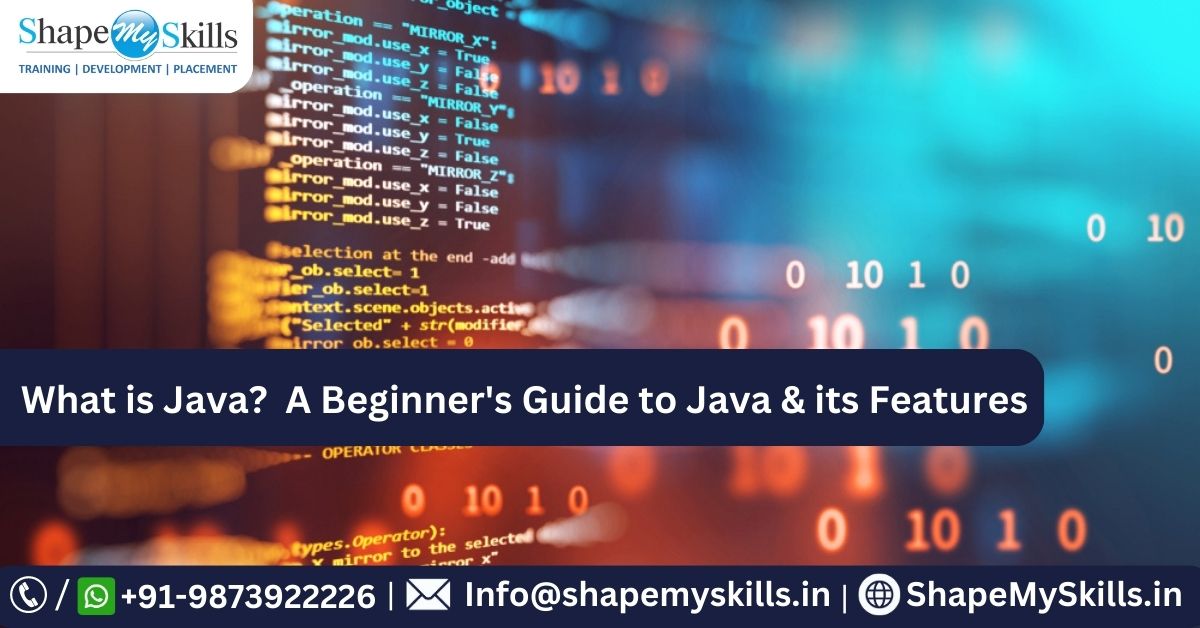Can Machines Really Make Predictions? Magic of Machine Learning
…

Java is a popular programming language that has transformed the software development landscape. With its simplicity, versatility, and platform independence, Java has become a go-to choice for developers worldwide.
In this blog, we’ll delve into the world of Java, understanding its essence, fundamental concepts, and standout features that set it apart. With simplicity and versatility at its core, Java has become a popular programming language. We’ll explore its uniqueness. From its object-oriented nature to platform independence, Java offers a robust foundation for building diverse applications. We’ll discover its rich standard library, which provides a vast range of pre-built functionalities. By participating in various Java Training in Noida provided by top rated training institutes, you can kickstart your career journey with a solid foundation. This immersive experience will provide you with practical knowledge, industry insights, and valuable skills that employers seek.
Java is a high-level, object-oriented programming language.
Java has transformed the software development landscape with its popularity and unique features. As a versatile and platform-independent programming language, it has become the preferred choice for developers globally. Whether you are a beginner programmer or seeking to expand your skill set, this guide offers valuable insights into Java and its capabilities.
By the end, you will have a solid foundation in Java, enabling you to start on your programming journey or further enhance your existing knowledge.
Java’s platform independence lets programs run on any system with a Java Virtual Machine (JVM), irrespective of the OS, simplifying cross-platform compatibility.
The JVM acts as an interpreter that translates Java bytecode into machine-readable instructions, enabling seamless execution across different platforms. This portability makes Java an attractive choice for developing cross-platform applications.
Java is an object-oriented programming (OOP) language, Objects are instances of classes, which encapsulate data (attributes) and behavior (methods). This approach promotes modular and reusable code, making it easier to develop complex applications. Key OOP principles supported by Java include encapsulation, inheritance, polymorphism, and abstraction. These concepts help in organizing code, enhancing code reusability, and simplifying the development process.
Java has a straightforward and readable syntax, making it easier for beginners to grasp. Each Java program starts with a class, which serves as the blueprint for creating objects. The code is written in plain text files with a .java extension. Java follows a strict structure, where statements are enclosed in blocks using curly braces. The main() method acts as the entry point for the program’s execution. Java uses a strongly-typed system, requiring explicit declaration of variables and data types.
Java incorporates automatic memory management via its garbage collection system, relieving developers of manual memory allocation and deallocation tasks.The JVM keeps track of allocated memory and automatically frees up resources that are no longer in use. This feature helps prevent memory leaks and simplifies memory management for developers.
Exceptions are unpredicted events that disrupt the normal flow of a program. Java provides a structured exception handling mechanism that allows developers to catch and handle exceptions gracefully. This ensures that programs continue to run even when errors occur, improving application stability and providing better user experience.
Certainly! Delhi, being an industry hub in India, offers numerous opportunities for professional growth and development. If you’re interested in Java training in Delhi, there are several reputable institutes that provide comprehensive Java training programs.
Java is a powerful and versatile programming language that offers a myriad of applications. Its simplicity, platform independence, object-oriented nature, and robust memory management make it an excellent choice for both beginners and experienced developers. By grasping the fundamental concepts and features of Java, you are equipped to embark on your software development journey. Java serves as a solid foundation for building diverse applications, whether it’s web development, mobile app development, or enterprise systems. Its platform independence allows you to create applications that can run on different operating systems seamlessly. The object-oriented approach facilitates modular and reusable code, enhancing productivity and code quality. Additionally, Java’s string memory management ensures efficient resource allocation. You can Choose Your Favorite Summer Training Institute in Noida to boost up your career. With Java as your programming language of choice, you have the tools to bring your ideas to life, whether it’s creating dynamic websites, innovative mobile apps, or robust enterprise solutions. You can also join Java Online Training.
